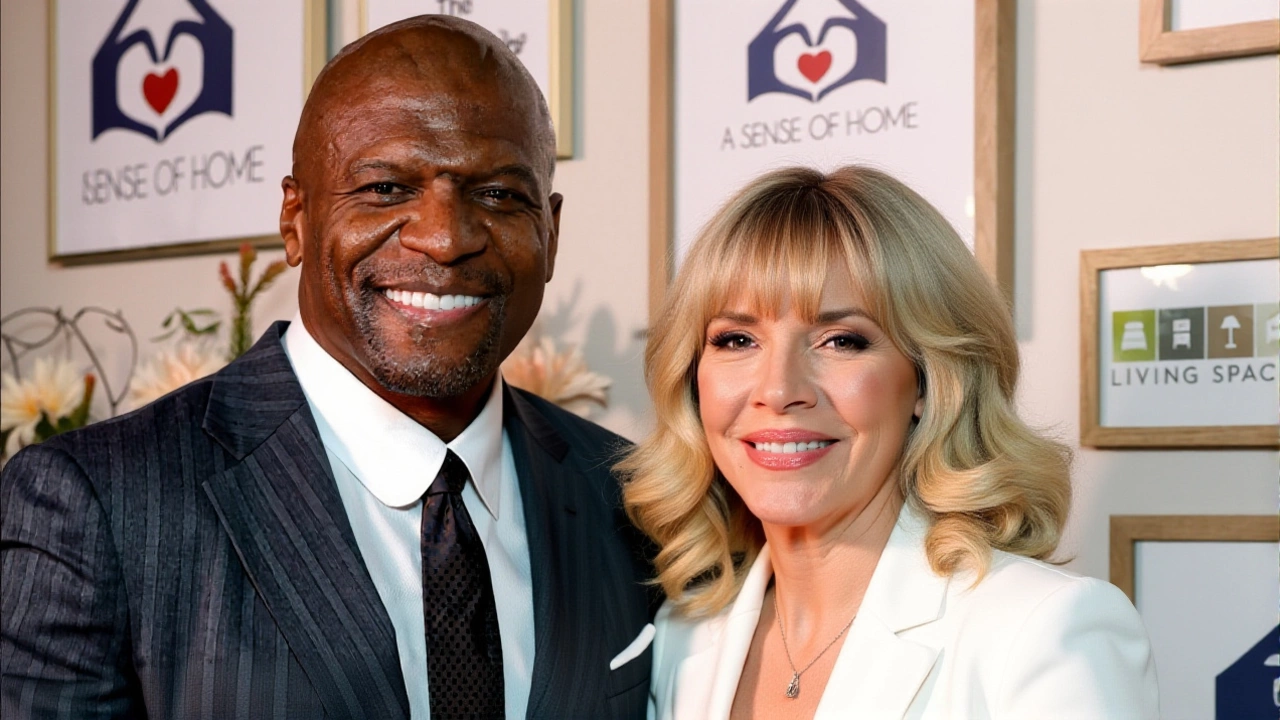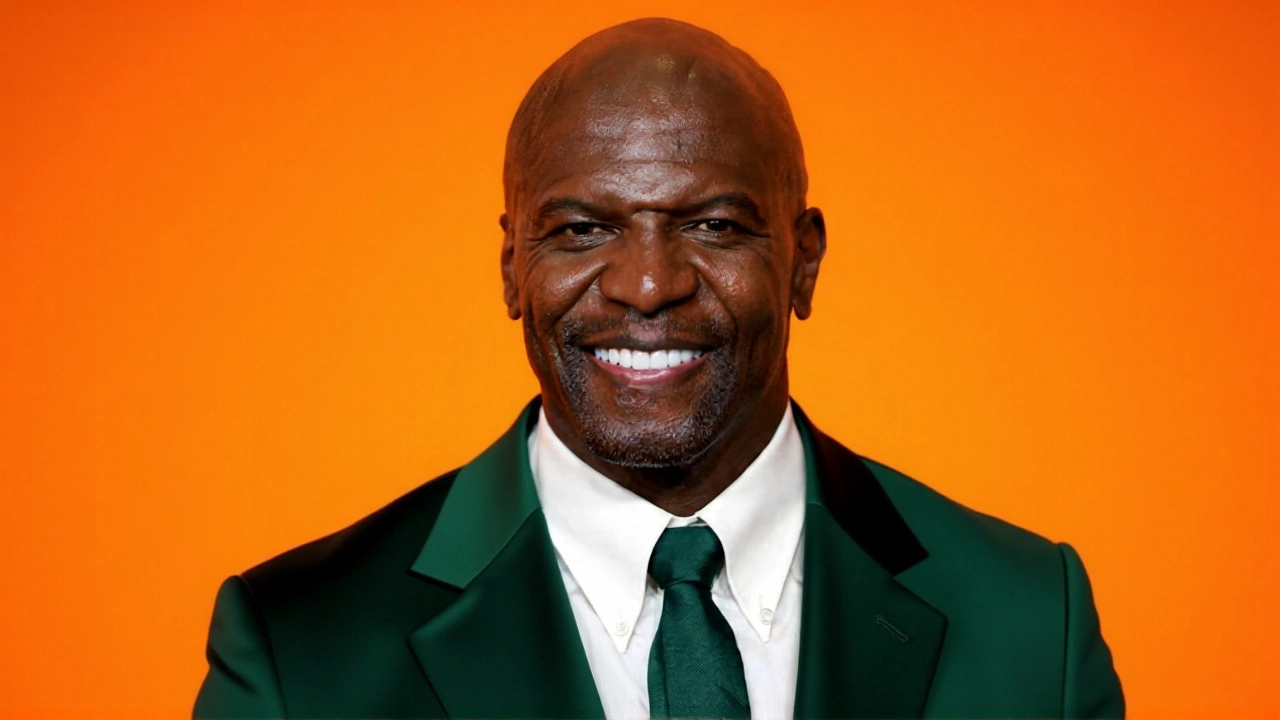When Terry Crews walked into rehab in 2010, he didn’t think he was an addict. He thought he was just a guy who watched too much porn. But the truth, as he later admitted, was far darker: his addiction had turned his wife, Rebecca King, into a stranger, his children into obstacles, and himself into a shell of guilt. The man best known for playing the lovable, muscle-bound Sergeant Terry Jeffords on Brooklyn Nine-Nine had spent nearly two decades hiding a secret that nearly ended his 36-year marriage — one that began on July 29, 1989 and nearly collapsed at year 20.
The Breaking Point: A Massage Parlor in Vancouver
It wasn’t a single lie that shattered things. It was the accumulation — the nights spent scrolling, the hours lost in hotel rooms, the emotional withdrawal from his family. But the moment everything changed came during the filming of The 6th Day in 2009. Crews, then 40, found himself on a binge so severe he drove to a massage parlor in Vancouver and cheated on Rebecca. When he confessed, she didn’t scream. She didn’t cry. She left. "I literally had to go to rehab for it," Crews told Dax Shepard on the Armchair Expert podcast in 2023. "My wife was like, ‘I don’t know you anymore. I’m out of here.’"" The fallout wasn’t just emotional — it was existential. "I felt like a failure," Crews said. "Every day, I’d watch porn from 10 a.m. to 11 p.m. and not stop. I couldn’t stop." He described the cycle: arousal, guilt, self-help books, more guilt. "I was a human pile of guilt," he told People magazine. "I didn’t quit porn to get my wife back. I quit to get my life back."How Addiction Rewired His Mind
Crews’ journey into recovery began at a specialized rehab facility that treated pornography addiction using a 12-step model — the same framework used for alcohol and drug dependence. "It was no different than any other thing that would numb you," he explained. "Drugs. Alcohol. Porn. Same brain chemistry. Same escape." What shocked him most wasn’t the behavior itself — it was how it changed his perception of people. "Pornography changes the way you think about people," he said. "They become objects. Body parts. Things to be used rather than people to be loved." He admitted to believing, during his addiction, that he was more valuable than Rebecca simply because he was a man. "When you believe that, you feel like they owe you," he said. "And I was wrong." The psychological toll extended to his children — daughters Naomi, Azriel, Tera, and Wynfrey, and son Isiah. "I’d be angry at them for getting in the way," he recalled. "I’d snap. I’d shut down. I wasn’t present. I was just… there. But not really there."Public Confession and the ‘Dirty Little Secret’ Videos
In 2014, Crews published his memoir, Manhood: How to Be a Better Man — or Just Live with One, where he first publicly detailed his struggle. But it wasn’t until 2017 that he went all-in. He posted three raw, unedited videos on Facebook titled 'Dirty Little Secret'. In them, he wept as he described his shame, his isolation, and his path to healing. The videos went viral, amassing over four million views. CNN, The Today Show, and Fight the New Drug picked up the story. Suddenly, a Hollywood star was talking about something society dismissed as "just natural." "I was told: ‘Man, you can’t be addicted to porn. It’s just who you are. Your wife’s got to understand that.’" Crews pushed back. "It’s fascinating how many people use pornography for fun. But fun doesn’t destroy marriages. Addiction does."
Rebuilding a Marriage, One Day at a Time
Recovery wasn’t just about quitting porn. It was about rebuilding trust. Crews and Rebecca entered intensive couples therapy. They talked — really talked — about intimacy, power, and worth. "We decided we were going to be stronger together," he told People. "It was a decision. Not a miracle. A choice." Today, nearly 14 years after his rehab stay, Crews says he’s been clean for six to seven years. He still talks openly about his journey, not to be a hero, but to be a warning. "Every time you look at pornography," he said in his videos, "it’s a desire for intimacy. You’re trying to fight your feelings of being alone." His story resonates because it’s not about sex. It’s about loneliness. About masculinity. About the quiet erosion of self-worth that happens when you use fantasy to escape reality.Why This Matters Beyond One Celebrity
Crews’ openness breaks a dangerous silence. While pornography use is widespread, few men — especially those in the public eye — admit to addiction. The stigma is real. Many believe they’re weak if they can’t control it. But Crews shows it’s not about willpower. It’s about trauma, shame, and unmet emotional needs. His experience mirrors research from the American Psychological Association, which links compulsive pornography use to increased rates of depression, anxiety, and relationship dissatisfaction. What’s rare is the public acknowledgment — and the successful recovery. "We don’t talk about this," says Dr. Lisa M. L. Smith, a clinical psychologist specializing in sexual health. "We treat it like a moral failing. Terry Crews reframed it as a mental health issue. That’s huge." His journey also highlights a growing trend: men seeking help for digital addiction. Clinics specializing in porn addiction have seen a 300% increase in male patients since 2015, according to the National Council on Sexual Addiction and Compulsivity.
What’s Next for Terry Crews?
Crews continues to speak at universities, men’s groups, and mental health summits. He’s working on a new book focused on emotional resilience in men. And he’s still married to Rebecca — their 36-year marriage now stands as a testament to what’s possible when two people choose healing over blame. "I didn’t save my marriage," he says. "We saved it. Together."Frequently Asked Questions
How did Terry Crews’ pornography addiction affect his children?
Crews admitted his addiction made him emotionally distant and irritable toward his five children — Naomi, Azriel, Tera, Wynfrey, and Isiah. He said he’d snap at them for "getting in the way," not because they were bad, but because he was lost in his own shame and isolation. This emotional withdrawal created a silent rift in the family, which he later addressed through therapy and intentional parenting after recovery.
What treatment did Terry Crews undergo for his addiction?
Crews entered a specialized rehabilitation facility that used a 12-step program modeled after substance abuse recovery. He participated in group therapy, individual counseling, and behavioral retraining to address compulsive viewing habits. Unlike typical addiction programs, this one focused on the neurological and emotional roots of pornography use, helping him rewire how he processed intimacy and guilt.
Did Terry Crews’ wife return because he quit porn?
No. Rebecca King returned only after Crews committed to long-term recovery — not just quitting porn, but rebuilding trust through therapy, vulnerability, and consistent emotional presence. She didn’t come back because he "fixed" himself; she came back because they both chose to rebuild the relationship together, step by step, over years of hard work.
Why did Terry Crews go public with his story?
Crews wanted to challenge the myth that men can’t be addicted to pornography — and that it’s "just natural." He saw how silence was hurting other men and families. By sharing his pain publicly, he hoped to reduce stigma, encourage men to seek help, and show that recovery is possible even after near-total marital collapse.
Is pornography addiction recognized as a clinical disorder?
While not officially listed in the DSM-5, compulsive sexual behavior disorder (including pornography addiction) is recognized by the World Health Organization in the ICD-11. Mental health professionals increasingly treat it as a behavioral addiction, with symptoms mirroring substance dependence: loss of control, escalation, and negative life consequences. Crews’ case helped bring mainstream attention to this emerging field.
How common is pornography addiction among men?
Studies suggest up to 10% of men report symptoms consistent with compulsive pornography use, with higher rates among those under 30. The National Council on Sexual Addiction and Compulsivity reports a 300% increase in male patients seeking treatment since 2015. Many don’t seek help due to shame — making Crews’ public disclosure a rare and powerful catalyst for change.
